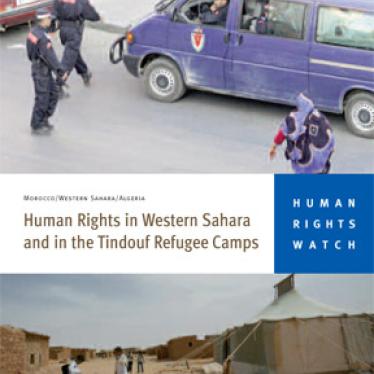His Excellency Ban Ki-Moon
Secretary-General
United Nations
Re: Human Rights Monitoring in Western Sahara and in Camps in Tindouf, Algeria
Your Excellency:
Our organizations, Human Rights Watch and the Robert F. Kennedy Center for Justice & Human Rights (RFK Center), have an established record of working on human rights issues in Western Sahara. Concerned about human rights violations against the Sahrawi people, we write to urge your support at the UN Security Council for the establishment of a UN mechanism that would monitor and report on human rights in Western Sahara and in the Sahrawi refugee camps in Tindouf, Algeria. When the Security Council reviews the mandate of the United Nations Mission for the Referendum in Western Sahara (MINURSO) this month, we ask that the mandate be extended to incorporate human rights monitoring in Western Sahara and in the camps in Tindouf.
When founded in 1991, the primary objective of MINURSO was to administer the settlement proposal between the Kingdom of Morocco and the Polisario Front, including overseeing the ceasefire and the implementation of a referendum on self-determination. However, for almost two decades now, the referendum has not been held.
In the interim, the Sahrawi people have suffered from serious violations of their individual and collective human rights. Moroccan authorities continue to subject those Sahrawis who openly advocate self-determination or who denounce Moroccan human rights violations to various forms of repression, including imprisonment after unfair trials, beatings, arbitrary restrictions on the right to travel, and denial of the right to peaceful assembly, association, and expression.
The case of Ms. Aminatou Haidar, the 2008 Robert F. Kennedy Human Rights Laureate, is emblematic. Ms. Haidar, currently president of the Collective of Sahrawi Human Rights Defenders, an organization Moroccan authorities have refused to recognize, was forcibly disappeared from 1987 until 1991. On June 17, 2005, police beat her on the head as she was arriving at a demonstration, then arrested her as she left the hospital where she had received stitches for her injury. A Moroccan court then convicted her in an unfair trial on charges of inciting and participating in violent demonstrations. She spent seven months in prison before being freed. On November 14, 2009, Morocco confiscated the passport of Ms. Haidar and summarily deported her to the Canary Islands because she had listed as her place of residence on her border entry form as "Western Sahara", an appellation Morocco does not recognize. Morocco did not agree to her return until December 17, 2009.
Human rights organizations, such as Amnesty International and Human Rights Watch, have long reported on these human rights violations. The Secretary-General's Report of 28 July 2009 to the General Assembly took cognizance of such reports. Further, in 2006, the United Nations Office of the High Commissioner for Human Rights (OHCHR) conducted a mission to examine the human rights situation in the region, although it never officially published the report it had prepared on its findings.
Your new report on Western Sahara, dated April 2010, notes, "The Frente Polisario called for a United Nations [human rights] monitoring mechanism, and Morocco expressed its opposition."
Sahrawis residing in the remote Polisario-run refugee camps in Tindouf live in a state of isolation and would, like residents of Western Sahara, benefit from the heightened protection that U.N. human rights monitoring would offer.
It is only fitting that the authority to monitor human rights in Western Sahara and in the camps in Tindouf be given to MINURSO. MINURSO is already present on the ground in Western Sahara, and has operated there since 1991. Also, MINURSO's mandate explicitly states that MINURSO would be governed by the general principles of United Nations peace-keeping operations. The United Nations Department of Peace-Keeping Operations (DPKO) identifies respect for human rights as a critical component for achieving sustainable peace integral to its operations. The mandate of MINURSO additionally provides for monitoring the "maintenance of law and order" in Western Sahara. The lack of a human rights monitoring component within MINURSO is therefore inconsistent with MINURSO's own mandate and the general principles of the DPKO. Further, although human rights monitoring is a standard feature in peacekeeping missions, MINURSO operates as perhaps the only contemporary U.N. peacekeeping mission without a human rights component.
In the event that the Security Council determines that MINURSO is not the most effective agency to take on these roles, we would endorse the assignment of another UN mechanism to monitor and report on human rights in Western Sahara and the camps in Tindouf. Either way, it is time for the UN to bring this peacekeeping mission into line with its other peacekeeping missions worldwide by ensuring that includes regular monitoring and reporting of human rights violations.
We thank you for your consideration of our request.
Sincerely,
Monika Kalra Varma
Director, RFK Center for Human Rights
Robert F. Kennedy Center for Justice & Human Rights
Sarah Leah Whitson
Executive Director, Middle East & North Africa Division
Human Rights Watch







